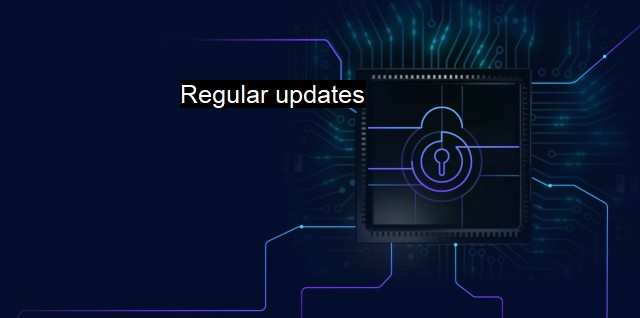What are Regular updates?
The Vitality of Cybersecurity: Understanding the Importance of Regular Updates
In the world of cybersecurity and antivirus mechanisms, the concept of “regular updates” carries significant importance. In the broadest sense, “regular updates” refers to the progression, modification, refinement, and enhancement of software, applications, and operating systems in terms of functionality, effectiveness, security, patches, threat detection protocols, and threat response measures. The context gets narrowed and exclusively pivotal in relation to cybersecurity and antivirus software, where continuously evolving threats warrant persistent upgrades and updates.Cybersecurity systems, including antivirus software, function to protect networks, systems, and data from cyber threats such as malware, ransomware, viruses, worms, and trojans, including zero-day exploits. The phrase 'regular updates' in this context implies maintaining these cybersecurity systems' competence in responding efficiently to both existing and newly discovered cyber threats. It includes the regular introduction of new features, enhancements, patches, and virus definitions to the software to ensure maximum security.
One significant part of regular updates within the domain of cybersecurity and antivirus software is the introduction of recent virus definitions. These definitions guide the antivirus software about the traits, behaviors, and markers of countless, known malware. An updated virus definition list allows for effective identification, isolation, and deletion of threat components.
Another vital part of 'regular updates' is software patches. Developers consistently work to identify potential software vulnerabilities. Once located, these flaws are rectified in the form of patches, which are then incorporated into the system via an update. Software vulnerabilities can provide infiltration points for hackers, hence, regular patching is critical.
Updates also typically introduce performance enhancement features aimed at ensuring the effectiveness and efficiency of security software. These improvements might involve streamlining the process, minimizing resource usage, or ensuring compatibility with other hardware or software. This aspect of regular updates is important for maintaining the user-friendly nature of the system, preventing it from becoming a burden on the computer or network resources, while ensuring maximum protection.
Advancements in cybersecurity technology such as artificial intelligence, machine learning, and behavioral analysis are usually rolled out via updates. These added capabilities heighten virus detection, response time while minimizing instances of false positives within the systems.
Regular updates work in contrast with the concept of threat evolution. Cybercriminals and their techniques are evolving faster than ever, developing advanced malware and sophisticated ways to breach security. As hackers exploit new vulnerabilities and design new viruses, consistent updates are required to keep the antivirus software aware and effective against these ever-changing threats.
The 'regular' in these updates is crucial to consider. Given the dynamic nature of the digital era, cyber threats also change rapidly. Attackers are continually evolving their strategies, inventing new methods of invasions, thereby making irregular or obsolete updates potentially catastrophic. By ensuring regular updates, networks and systems stay prepared for newly emerging threats and vulnerabilities.
“regular updates” in the context of cybersecurity and antivirus software is a continually ongoing process ensuring maximum protection against cyber threats. By incorporating new virus definitions, software patches, performance enhancements, and advancements in technology, it provides defenses against hackers and their evolving techniques subtracting significant threats to virtual safety. The practice of implementing regular updates is an indispensable facet of cybersecurity, tantamount to maintaining a potent shield against the forays of detrimental digital entities.

Regular updates FAQs
Why are regular updates important for cybersecurity and antivirus software?
Regular updates are important for cybersecurity and antivirus software to ensure that any vulnerabilities or weaknesses in the software are patched and fixed. Cyber threats are constantly evolving, so updating your software regularly will help keep your system protected against the latest threats.How often should I update my antivirus software?
It is recommended that you update your antivirus software at least once a week to ensure that you have the latest virus definitions and protection. However, if there is a critical security patch or update, it is important to update your software as soon as possible.What happens if I don't update my antivirus software regularly?
If you don't update your antivirus software regularly, your system may be vulnerable to the latest cyber threats and viruses. Cybercriminals are constantly finding new ways to exploit vulnerabilities in software, and if you are not updating your antivirus software, you may not be protected against these threats.Can I set my antivirus software to update automatically?
Yes, most antivirus software allows you to set up automatic updates. This is the most convenient way to ensure that your software is always up-to-date and protected against the latest threats. It is important to make sure that automatic updates are enabled and set to run at a time when you are not using your computer to avoid interruptions.| | A | | | B | | | C | | | D | | | E | | | F | | | G | | | H | | | I | | | J | | | K | | | L | | | M | |
| | N | | | O | | | P | | | Q | | | R | | | S | | | T | | | U | | | V | | | W | | | X | | | Y | | | Z | |
| | 1 | | | 2 | | | 3 | | | 4 | | | 7 | | | 8 | | |||||||